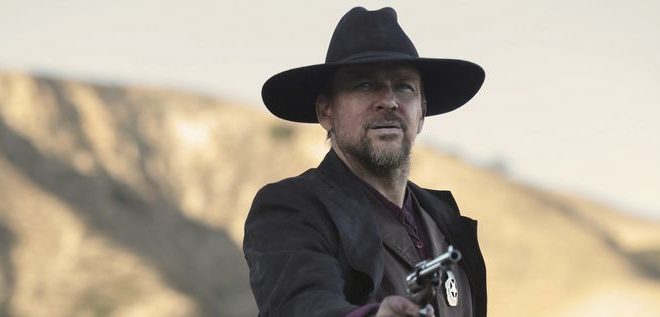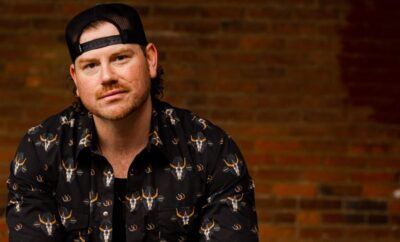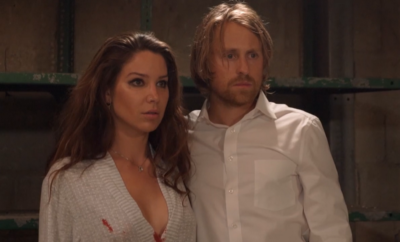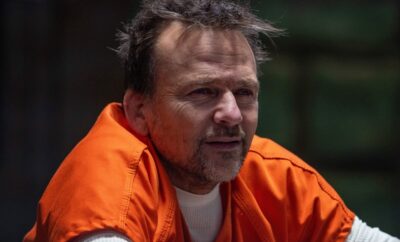
Interviews
Sean Patrick Flanery – The Outsider
By: Jamie Steinberg
Q) What are the recent projects that you are working on?
A) Well, The Outsider is one that I’m incredibly excited about. It’s not often you get the opportunity to shoot an old a gritty, old school Western a la Josey Wales – before John Wayne. I just saw the screener to the film and I was incredibly excited with the result. I can’t wait to see it at the premiere! I’ve done a lot of independent films and a lot of them never see the light of day. There are so many variables that go into making a good film that when it all comes together it’s not only impressive, but it’s really rare. This falls into that category. I’m excited as shit about this film!
Q) How was Chris King in The Outsider originally described to you?
A) It wasn’t. I read the script. I tend to not read anybody’s interpretation. Whenever they give a character breakdown I try to dismiss that and go with my own. So many people put their own subtext into it and what they think the underlying meaning of something is and I never want to be tainted by that. I like to read the story on my own and develop my own sense of who this guy is, where he came from, where he is going, what his ideas, secrets and dreams are. I knew he was a guy who lost two arms and two legs, metaphorically speaking, and he kind of lost his reason. And that’s a dangerous person to go against. Someone who doesn’t fear death is a dangerous opponent. That made this guy really flavorful to play.
Q) Was there anything you added to the role that wasn’t initially scripted for you?
A) There was an immense amount. [laughs] Love it or hate it, all the single bullet stuff I added – kind of all of that backstory. That’s the wonderful thing about filmmaking and movie making, it’s a collaboration – some of which are shot down and some of which are embraced. That whole lost backstory that I didn’t think was flushed so we kind of prevented that story with a single bullet in the chamber – with a single target for that single bullet. And that’s kind of the essence of the story.
Q) You are a pro at on screen gun work at this point, but did you need to do some specific gun training for the film?
A) The answer to that is I’m from Texas. [laughs] That’s just what you do growing up, but it was fun. Man, it was fun. Just putting the costume on and the rig on your hip. Fun! Really, really fun.
Q) You had some great scenes with Trace Adkins. Talk about working with him.
A) It is hard to stay awake, only because his voice is a sedative. In my wildest dreams, I wish I had a voice like that. [laughs] He was a great dude. Some of my fondest memories are sitting in between takes listening to him telling stories in that voice. It’s crazy! Wonderful guy. Wonderful guy! So, it was a pleasure doing scenes with him.
Q) The cinematography was incredible to the movie and it almost played a character in itself. How did the setting for the film played such a fabulous role as well?
A) Pablo [Diez], the DP, is a well-respected cinematographer so he was kind of one of the stars of this entire show. When you see it on the screen, it makes sense. So much goes into the photography – not just how you light something, but the composition and the placement of the characters on screen. There is always a reason for every placement with nuance and finesse and he handled it brilliantly. With any Western, the landscape itself tells a story and we shot this at a time when it was gorgeous. A lot of the fires were raging. A lot of our sets were destroyed in the fires. A lot of the smoke-filled skies made for wonderful coloring. That’s kind of horrific to say that some of the beauty came out of the damage, but that’s the truth. A lot of families were traumatized by that. There was a lot of catastrophe and we lost a set, which put us out of production for a couple of days. It was shot in the desert and it was absolutely gorgeous. As far as the eye can see there is nothing man made. It was a pretty wonderful canvas to place a Western on.
Q) What advice did director Timothy Woodward, Jr. offer that you took to heart while filming?
A) The relationship between an actor and director I always find is as such…If the director does his first job perfectly, that’s the only job he really has to do – as far as the actor goes. I’m not saying this was the case with me, but if I’m directing something and I cast it perfectly that really limits the conversation I need to have with an actor. I’m certainly not saying that was me that as he cast this perfectly, but with Trace…I thought Trace slipped into that character and I never really saw them discuss any changes. Trace just showed up on set and was exactly who I saw when I read the script. Kaiwi [Lyman] was another character that did that. I never really saw the director say much to Kai because Kai showed up on set and did exactly the character I saw when I read the script. Myself and Tim had a number of conversations. There were some things he wanted for the character and some things I wanted for the character and I love that type of collaboration. I love to get some insight from the director and get his vision to try and really perfect a combination of his and mine. Hopefully, we came in the ballpark on that.
Q) What were some of your favorite moments from filming?
A) My least favorite was doing a fight scene in thirty-degree nighttime weather with thirty-degree water being poured over my head. [laughs] It was uncomfortable, but I think we did a pretty impactful scene. All of the fight scenes…Kai and I have been doing Brazilian Jiu Jitsu for a long time so doing the stunt sequences were wonderful. Those were some incredibly memorable scenes. Anything involving my six-gun – being able to unholster and reholster it, spin it, flip it and turn it. Those are a kid’s fantasy. All in all, this is a kid’s dream and a big part of me is still a kid.
Q) What do you think it is about this particular story that will make it a fast favorite film?
A) Any time you strip a story down to the very, very basics of human nature is intriguing on its own. For my character, I feel like he had all three branches of government on his hip in his holster. That makes for a very, very powerful statement.
Q) What else do you want to be sure our readers know about working on The Outsider?
A) You watch these and you expect it to not come together because I do independent films and I see the results. And a lot of the times the result is not what you read in the script. This actually hit it out of the park. I’m proud as shit of this film and I was proud as shit of this film. I watched it and I was like, “Damn! I like this a lot!”
Q) You are a very talented author as well. Can we expect some new books on the horizon on the near future?
A) I wrote the follow-up, which I allude to in the first book. But, oddly enough, I’m not sure I’m going to release that – certainly not now. Jane Two has taken on a second set of legs with word of mouth. A lot of people have turned their friends on to it so it has kind of been a slow build. So, I’m going to give that a little breathing room and see what happens to that. I finished the manuscript [phew] pretty soon after the first one came out. But it’s in my back pocket. I’m not opposed to releasing it at some point in the future, but I want to give Jane Two a little time to breath and try my best to possibly make it into a film. I’ve been approached by a number of companies already, but I want it to be the right marriage because it’s obviously very close to my heart and a pretty special piece of material for me. Hopefully, I can execute that correctly.
Q) What would you like to say to everyone who is a fan and supporter of you and the work you do?
A) Well, anyone who is a fan and supporter of me and my work thank you from the bottom of my heart. It tickles the shit out of me. Really, the currency that an actor gets is that kind of feedback. So, any time I see something online with someone who did something for me or comments (good or bad) that’s where you get this reciprocal current of energy. When you do film, you don’t get a direct response. When you do theater, you tell a joke and the audience laughs. When you do something dramatic, the audience gets sad. You can see that transpose in real time. In film, it’s not the case. The sound guy is just making sure there is not a jet flying overhead. He’s not listening to what you say. The camera operator is making sure the boom is not in the shot. He’s not watching what you do. So, to get the feedback it comes from the fans. So, really that is sustenance for my soul. It really is. I appreciate it and I embrace it and I hope it never goes away. I don’t take it for granted at all.





You must be logged in to post a comment Login